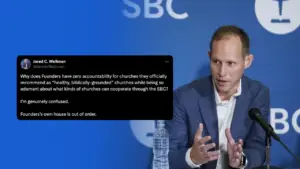It seems that none of us has difficulty presenting anecdotes about congregationalism gone awry, elder leadership out of balance, pastor/deacon conflict, et al. All of us have stories. I certainly have mine, as also does Bart Barber in his helpful article on church polity. While anecdotes add a bit of spice to our discussion, they do not set precedent for anyone else. In other words, if I tell you a horror story about a dictatorial pastor or rogue deacons or hyper-congregationalism, it proves nothing in the grand scheme of church polity except that human sinfulness enters into even the most sacred charges. So, the best thing for us to do in deciding polity is not to be swayed by anecdotes—good or bad, positive or negative. Rather, we must go back to the foundation of the sufficiency of Scripture as we grapple with local church polity.
Polity Chapter and Verse
The first roadblock that we run into with determining biblical church polity is that there is no one biblical book or chapter that contains the total schematic for local church polity. Admittedly, much of the material that we generally put together for polity is found in the Pastoral Epistles (PE). Yet even in the PE, the focus seems to be more on the character and qualifications of those serving the congregation instead of on the specific roles that they perform, although they are not without some insight on the roles.
Yet, does that not tell us something of critical importance? If the largest section on church polity (1 Tim 3:1–13; Titus 1:5–9) addresses the character of those holding the offices of overseer (elder) and deacon, then it seems that the greatest concern that we must hold is for godly servant leaders. Character trumps function every time! So there may be variations on how elders and deacons serve from one congregation to another, as they serve according to the local congregation’s pleasure. But there should never be a question as to the quality and character of those serving! Unfortunately, while we debate the elder/deacon roles, many of our congregations suffer with men holding both offices without the corresponding character called for in the PE.
While we agree as Baptists that there are two offices in the church, that of elder/pastor/overseer (the terms are used synonymously)[1] and deacon, we only find those two offices listed together in Scripture in two places: 1 Timothy 3 and Philippians 1:1. Yet adequate treatment of both offices throughout the New Testament helps us to understand the distinction of the first as a shepherding role and the latter as a servant role. [2] But what is required in the shepherding role?
Elder/Overseer Roles
As we trace the emergence of elders in the New Testament church life, there is no announcement of elder polity starting (or any polity starting, for that matter). Instead, Luke mentions rather matter-of-fact the existence of elders in the Jerusalem church who would receive a gift from the Antioch church via Barnabas and Saul (Paul) (Acts 11:30). On the next occasion of elders in the early church, we find Paul and Barnabas appointing elders (plural) in every church (singular) in their first missionary journey in the Galatian region. [3] The plurality of elders in each church had charge of the spiritual development of those fledgling congregations. The elders were appointed “for them in every church.” We need not think of these appointments in the neatly organized way that we make modern distinctions of staff and non-staff. More than likely, the men serving as elders maintained their same jobs, but doubled up to care for the flocks under their care through preaching, teaching, and pastoral care. Otherwise the small congregations would have immediately taken on the weight of financial support.
The next mention of elders in Acts identifies presbyters serving alongside apostles, with particular concern for the doctrine of the church (Acts 15). Elders came together with the apostles “to look into the matter” of those who wanted to add to the purity of the gospel of Jesus Christ alone for salvation. That the elders joined in this doctrinal matter, exercising spiritual authority in the church alongside the apostles, demonstrates later responsibility for elders. That’s why Paul told Titus that an elder is to hold “fast the faithful word which is in accordance with the teaching [doctrine], so that he will be able both to exhort in sound doctrine and to refute those who contradict” (Titus 1:9).
By this time in the life of the early church, elder plurality seemed established. Several years later, during the third missionary journey, Paul met with the Ephesian elders (note the plurality of elders) as he journeyed fatefully to Jerusalem (Acts 20). We find the synonymous use of elders and overseers (Acts 20:17, 28), along with the verbal form of pastor (to shepherd, 20:28), as Paul exhorts this group of spiritual leaders. They were to guard themselves—so mutual accountability for their spiritual walks—and “all the flock, among which the Holy Spirit has made you overseers, to shepherd the church of God which He purchased with His own blood” (Acts 20:28). What was involved in such guarding and shepherding? Did this mean that all of them necessarily preached? We do get the clear indication from 1 Timothy 5:17 that some did preach, but not all. Others appeared more gifted in pastoral oversight or in administrating matters of the church. Yet all had the responsibility for teaching sound doctrine to the flock of God (1 Tim 3:2; Titus 1:9). All were to be engaged in shepherding (Acts 20:28; Heb 13:17; 1 Peter 5:2) and setting an example for the church to follow in living out the gospel (1 Peter 5:3; Heb 13:7).
The Rise of the Monarchical Episcopate
Until the time of Ignatius, Bishop of Antioch in Syria in the 2nd century, no evidence of a separate office distinct from the synonymous overseer/elder/pastor had arisen. Clement spoke of “the office of the episcopate,” not as distinct from elders but as the elders of the church chosen “with the consent of the whole Church.” He further used the episcopate and presbyters synonymously within the same paragraph. [4]

But something happened to swing the early church’s polity away from the two offices of elder/overseer/pastor and deacon. Ignatius’ numerous epistles took up the distinction of the office of “bishop” as a position of preeminence in the church, with presbyters considered the second tier of leadership, followed by deacons as servants. [6] Yet he did still maintain a measure of congregationalism, and not strict rule by the bishop as later took place, when he called for the Philadelphian church to elect a deacon to send as an ambassador to Syria. [7] However, the rise of the monarchical episcopate began with Ignatius’ letters.
While we can see the development of supremacy in the bishops as history developed, some of the initial reasons under Ignatius for identifying a single bishop in leadership over a local church appeared to be to maintain sound doctrine, continuity of leadership, and unity in the church. While noble in desire, and perhaps the best option at the time, although that could be much debated, it morphed into the eventual dominance by the bishop of Rome as the supreme bishop over the church. We certainly reject that external control over local congregations! Yet do we not learn something about the nature of losing the sense of equality in local church leadership? While Ignatius appeared to be a gracious, faithful leader in the early church, others were not so humble or gentle or concerned for the welfare of the church. They asserted their power over the congregations and over the presbyteries to their shame and the harm of the church.
Conclusion
It is best to follow the example of the New Testament than the example of Ignatius. In the New Testament we find consistent use of plural elders serving in local congregations on equal footing. Does that mean that one might not have been the primary preacher or the most prominent leader? Certainly not, yet maintaining equality despite gifts, calling, and roles of service within the congregation kept the leaders of local churches more accountable to one another. Equality in the office of elder does not mean that everyone does the same job or has the same gifts or gets equal time in speaking to the flock. Rather, for the health of the body of Christ, elders will wisely organize and serve according to the gifts, strengths, and call of Christ with each man among them, while they hold one another accountable to live as men of God, setting an example for the flock. And that still seems to be a wise pattern for Baptist churches.
__________
[1] See Benjamin L. Merkle, The Elder and Overseer: One Office in the Early Church (SBL 57; Hemchand Gossai, gen. ed.; New York: Peter Lang, 2003), for a superb, scholarly investigation on the synonymous usage of the terms elder and overseer.
[2] See John Hammett, Biblical Foundations for Baptist Churches: A Contemporary Ecclesiology (Grand Rapids: Kregel, 2005), 159–215, for a thoughtful, biblical treatment of elders and deacons in congregational polity. Hammett wisely shows the flexibility within the biblical skeleton on polity that various churches might adopt.
[3] Simon J. Kistemaker, NTC: Acts, 527, argues from the use of cheirontonasantes, “appointed,” that it infers that the congregation raised their hands in a type of voting procedure to affirm the choice of the elders.
[4] Clement, The First Epistle of Clement (ANF 1:44).
[5] Polycarp, The Epistle of Polycarp (ANF intro.; 5; 10).
[6] E.g., Ignatius, Epistle of Ignatius to the Ephesians (ANF 4); The Epistle of Ignatius to the Magnesians (ANF 2; 6).
[7] Ignatius, Epistle of Ignatius to the Philadelphians (ANF 10); he did the same congregational request in his Epistle of Ignatius to Polycarp (ANF 7).





















